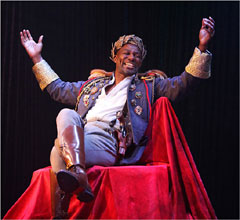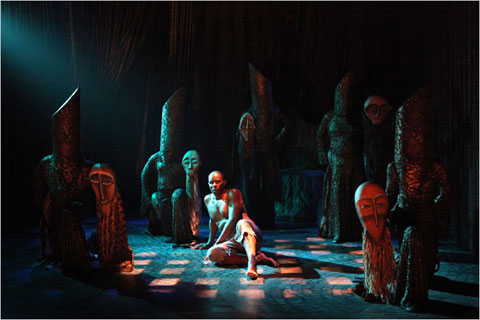By BEN BRANTLEY
The
fallen emperor has been returned to glory.
It’s not that things turn out any happier for the ill-fated title
character of Eugene O’Neill’s “Emperor Jones,” as the last hours of
his life are played out at the Irish Repertory Theater, where Ciarán
O’Reilly’s inspired revival opened Sunday night, starring a wondrous
John Douglas Thompson.
 |
|
|
John
Douglas Thompson plays the title role in Eugene O’Neill's
"The Emperor Jones." |
Once
again Brutus Jones, the African-American island despot, is cruelly
and systematically stripped of his majesty, his dignity and all the
finer traits that separate man from beast. But in the play that
bears his name, an ember of real magnificence has been uncovered and
fanned, gently and artfully, into a blazing flame.
Set in a fluid, shadowy dreamscape, through which Mr. Thompson moves
like a thrashing sleeper in a nightmare, this “Emperor” digs into
recesses of the every-mind, setting off Jungian echoes of universal
resonance in a work often perceived as a dated portrait of the black
man’s burden. While much of Mr. O’Reilly’s production occurs in
near-darkness, I can’t think of another show (in what has been a
mostly lusterless theater season) that burns brighter.
This act of illumination is a pinnacle in the rethinking of
O’Neill’s short, brutal play, which spent decades moldering in that
corner cupboard reserved for embarrassing works by great writers.
Though it electrified New Yorkers (including Alexander Woollcott of
The New York Times) when it opened in 1920, “The Emperor Jones” came
to seem shocking for all the wrong reasons in later years.
|
 |
|
John Douglas Thompson in
O’Neill’s “Emperor Jones,” directed by Ciarán O’Reilly. |
Here, after all, was a portrait of an African-American man who,
briefly endowed with power, was forced to crawl backward through the
phases of civilization, talking all the while in the thick “sho’
nuff” dialect of minstrel shows. When the avant-garde Wooster Group
performed the piece in the 1990s, a white actress (the superb Kate
Valk) played Jones in blackface. And the production became a
stinging depiction of black culture perceived through a white
world’s distorting, contemptuous and uneasy gaze.
I thought that the Wooster Group’s fiercely articulate
interpretation might be the last word on “The Emperor Jones.” Then I
saw Thea Sharrock’s fine, confrontational production at the Gate
Theater in London in 2005. (It later transferred to the National.)
Set in a sand-floored box that suggested a safari hunter’s pit for
big game, this “Emperor Jones” (starring Paterson Joseph) was played
with great anger and no irony. It exuded the painful desperation of
a man ensnared like a hounded animal, twisting in a trap forged by
years of repressive history.
Ms. Sharrock’s version invested “The Emperor Jones” with a visceral
immediacy that suggested the upsetting impact it must have had in
the 1920s. Mr. O’Reilly’s interpretation retains that charge of
power, but also elicits the poetry and haunting musicality in
O’Neill’s text.
Making exquisite use of dreamlike masks and puppets (by Bob
Flanagan) and an aural backdrop (by Ryan Rumery and Christian
Frederickson) that seems to originate in your own head, this
“Emperor Jones” is quieter and stealthier than any I’ve seen. Its
eerily lowered voice makes the case for the play as a study in the
black hole of unconsciousness (a subject just entering the
mainstream conversation in the era when it was written, and one that
fascinated O’Neill).
A shivery whisper runs through this production as Jones, a former
railroad porter and convict, descends into primal fear: It says that
the wall between human reason and animal instinct is far frailer
than we like to pretend. This tin-pot emperor, forced to retreat
into the jungle when his subjects rise up against him, is no
sociological specimen. He becomes what we’re all scared of turning
into, when adrenaline floods us in moments of raw anger or terror.
That’s partly because Mr. Thompson makes it impossible not to
identify with Jones. An impressive Othello last season (both for
Shakespeare & Company in Lenox, Mass., and Theater for a New
Audience in New York), this brawny actor has a naturally commanding
physical presence, with a rich baritone voice to match. But these
assets are only a small part of what makes his Jones so compelling.
This Emperor is from the beginning a figure of subtly mixed,
potentially explosive elements, kept in tenuous balance. Like any
successful ruler, of a business or a country, he’s smart enough to
know that power is largely a matter of show. “Ain’t a man’s talkin’
big what makes him big— long as he makes folks believe it?” Jones
asks Smithers (the excellent Rick Foucheux), his Cockney henchman,
in the opening scene.
But there’s apprehension within this self-awareness, the sense that
Jones’s isn’t always comfortable in his grand, imperial postures.
His anger comes too quickly, and when he cracks his whip for show (a
motif with a harrowing echo in a later scene), you feel he’s losing
control. This is a man daunted as well as delighted by the outsize
shadow he casts, and he reminds us that recent history is full of
examples of tyrants made freakish by power.
As Jones divests himself by degrees of his crown, his boots and his
shirt, Mr. Thompson seems to go even further, showing us the skull
beneath the skin and the furiously beating heart within the rib
cage. In the reading, the late sections of the play can seem
painfully allegorical, as Jones is confronted by specters not only
of his own criminal past but also of a collective cultural past that
embraces a slave auction and mystical tribal ceremonies.
But the forms that Mr. O’Reilly and his creative team give these
phantoms, including an early set of apparitions identified in the
script as “little formless fears,” have the disturbing beauty—and
internal logic—of a symbolist painting.
Every aspect of design—Charlie Corcoran’s set and Antonia
Ford-Roberts’s costumes, Brian Nason’s transfiguring lighting and
Mr. Flanagan’s living puppets—feeds into a complete vision of
interior doubts erupting into a dominating external life. By the end
of Jones’s journey he is beyond controlling even his physical
movements, a process reflected with anguished precision in Barry
McNabb’s enriching choreography.
I don’t want to be too specific about the visions that this
production conjures up as we follow Jones, almost against our will,
into dementia. They surprised and rattled me, and I imagine they’ll
have the same effect on you. But let me say that though I’d never
thought of it before, “The Emperor Jones” turns out to be a perfect
Halloween entertainment for grown-ups. As this magical production
makes clear, O’Neill, a man of many demons, understood all too well
that everyone is his own boogeyman.

